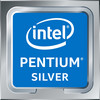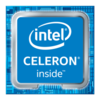Intel Pentium Silver N6000 vs Intel Celeron N4500 vs Intel Celeron N5105
Intel Pentium Silver N6000
► remove from comparison
The Intel Pentium Silver N6000 is a quad-core SoC of the Jasper Lake series that is primarily intended for inexpensive notebooks and was announced in early 2021. The four Tremont CPU cores clock between 1.1 and 3.3 GHz (single core Burst) and offer no HyperThreading (SMT). The N6000 uses 1.5 MB L2 and 4 MB L3 cache. The chip is manufactured on the first-gen 10 nm Intel process, the same process as Ice Lake.
Architecture
The processor architecture is called Tremont and a complete redesign compared to the old Golmont Plus cores in the predecessor. According to Intel, the single thread performance of a core could be improved by 30% on average (10 - 80% in all tests of SPECint and SPECfp).
Features
In addition to the four CPU cores, the SoC integrates a 32 EU Intel UHD Graphics GPU clocked from 350 - 850 MHz and a dual-channel DDR4 / quad-channel LPDDR4x memory controller (up to 16 GB and 2933 MHz). The chip now also partly integrates Wi-Fi 6 (Gig+), 8 PCIe 3.0 lanes, 14 USB 2.0/ 3.2 ports and two SATA 6.0 ports. The package got bigger and measures 35 x 24 mm (compared to 25 x 24 mm for the N5030 e.g.). The SoC is directly soldered to the mainboard (BGA) and can't be easily replaced.
Performance
The average N6000 in our database proves to be an OK entry-level processor, as of late 2022, its multi-thread benchmark scores nearly matching those of the AMD Ryzen 3 3200U. Yes, the chip is a whole lot slower than the latest Ryzen 3 and Core i3 processors, but it will at least let you run your day-to-day apps without annoying slowdowns.
The Asus Vivobook 13 Slate is among the fastest systems built around the N6000 that we know of, thanks to the long-term CPU power limit of 10 W. It can be more than 20% faster in CPU-bound workloads than the slowest system featuring the same chip in our database, as of August 2023.
Power consumption
Like nearly all other N-class Intel processors, the Pentium N6000 has a default TDP of 6 W (also known as the long-term power limit). This is low and thus good enough for passively cooled tablets, laptops, mini-PCs.
The SoC is built with Intel's 2nd generation 10 nm process (not 10 nm SuperFin or Intel 7) for low, as of mid 2023, energy efficiency.
Intel Celeron N4500
► remove from comparison
The Intel Celeron N4500 is a dual-core SoC of the Jasper Lake series that is primarily intended for inexpensive notebooks and was announced in early 2021. The two Tremont CPU cores clock between 1.1 and 2.8 GHz (single core Burst) and offer no HyperThreading. The N4500 uses 1.5 MB L2 and 4 MB L3 cache. The chip is manufactured on the first-gen 10 nm Intel process.
Architecture
The processor architecture is called Tremont and a complete redesign compared to the old Golmont Plus cores in the predecessor. According to Intel, the single thread performance of a core could is up two 30% better on average (10 - 80% in all tests of SPECint and SPECfp).
Features
In addition to the dual-core CPU block, the SoC integrates a 16 EU Intel UHD Graphics GPU clocked from 350 - 750 MHz and a dual-channel DDR4 / quad-channel LPDDR4(x) memory controller (up to 16 GB, up to 2933 MHz). The chip now also partly integrates Wi-Fi 6 (Gig+), 8 PCIe 3.0 lanes, 14 USB 2.0/ 3.2 ports and two SATA 6.0 ports. The package got bigger and measures 35 x 24 mm (compared to 25 x 24 mm for the N5030 e.g.). The SoC is directly soldered to the mainboard (BGA) and can't be easily replaced.
Performance
The average N4500 in our database shapes up to be a fairly slow processor, its multi-thread benchmark scores only just matching those of the Core i3-4010U. (The latter saw the light of day in 2013 as a lower mid-range, dual-core CPU designed for use in ultraportable laptops.) In other words, expect the Celeron to be painfully slow in all but the most basic activities.
You mileage may vary depending on how high the CPU power limits are.
Power consumption
Like most N-class Intel chips, the Celeron has a default TDP (also known as the long-term power limit) of 6 W. This is not much at all and thus good enough for passively cooled tablets, laptops, mini-PCs.
The Celeron N4500 is built with Intel's 2nd generation 10 nm process (not 10 nm SuperFin or Intel 7) for low, as of mid 2023, energy efficiency.
Intel Celeron N5105
► remove from comparison
The Intel Celeron N5105 is a quad-core SoC of the Jasper Lake series that is primarily intended for inexpensive desktops and was announced in early 2021. The four Tremont CPU cores clock between 2 and 2.9 GHz (single core Burst) and offer no HyperThreading (SMT). The N5105 uses 1.5 MB L2 and 4 MB L3 cache. The chip is manufactured in 10nm at Intel (most likely in the same process as Ice Lake).
CPU Architecture
The processor architecture is called Tremont and a complete redesign compared to the old Golmont Plus cores in the predecessor. According to Intel, the single thread performance of a core could be improved by 30% on average (10 - 80% in all tests of SPECint and SPECfp).
Features
In addition to the quad-core CPU block, the SoC integrates a 24 EU Intel UHD Graphics GPU clocked from 450 - 800 MHz and a LPDDR4(x) dual channel memory controller (up to 16 GB and 2933 MHz). The chip now also partly integrates Wi-Fi 6 (Gig+), 8 PCIe 3.0 lanes, 14 USB 2.0/ 3.2 ports and two SATA 6.0 ports. The package got bigger and measures 35 x 24 mm (compared to 25 x 24 mm for the N5030 e.g.). The SoC is directly soldered to the mainboard (BGA) and can't be easily replaced.
Performance
The average N5105 in our database is in the same league as the Core i3-1005G1 and the Ryzen 3 3250U, as far as multi-thread benchmark scores are concerned. Your mileage may vary depending on how high the CPU power limits are.
Power Consumption
Similar to the predecessor, Intel specifies the TDP with 10 Watts (mobile and lower clocked N5100 6W). The chip can therefore be cooled passively in theory, but SKUs with fans are possible as well.
| Model | Intel Pentium Silver N6000 | Intel Celeron N4500 | Intel Celeron N5105 | ||||||||||||||||||||||||||||||||||||||||||||||||||||||||||||||||||||||||||||||||||||||||||||||||
| Codename | Jasper Lake | Jasper Lake | Jasper Lake | ||||||||||||||||||||||||||||||||||||||||||||||||||||||||||||||||||||||||||||||||||||||||||||||||
| Series | Intel Jasper Lake | Intel Jasper Lake | Intel Jasper Lake | ||||||||||||||||||||||||||||||||||||||||||||||||||||||||||||||||||||||||||||||||||||||||||||||||
| Series: Jasper Lake Jasper Lake |
|
|
| ||||||||||||||||||||||||||||||||||||||||||||||||||||||||||||||||||||||||||||||||||||||||||||||||
| Clock | 1100 - 3300 MHz | 1100 - 2800 MHz | 2000 - 2900 MHz | ||||||||||||||||||||||||||||||||||||||||||||||||||||||||||||||||||||||||||||||||||||||||||||||||
| L2 Cache | 1.5 MB | 1.5 MB | 1.5 MB | ||||||||||||||||||||||||||||||||||||||||||||||||||||||||||||||||||||||||||||||||||||||||||||||||
| L3 Cache | 4 MB | 4 MB | 4 MB | ||||||||||||||||||||||||||||||||||||||||||||||||||||||||||||||||||||||||||||||||||||||||||||||||
| Cores / Threads | 4 / 4 | 2 / 2 | 4 / 4 | ||||||||||||||||||||||||||||||||||||||||||||||||||||||||||||||||||||||||||||||||||||||||||||||||
| TDP | 6 Watt | 6 Watt | 10 Watt | ||||||||||||||||||||||||||||||||||||||||||||||||||||||||||||||||||||||||||||||||||||||||||||||||
| Technology | 10 nm | 10 nm | 10 nm | ||||||||||||||||||||||||||||||||||||||||||||||||||||||||||||||||||||||||||||||||||||||||||||||||
| max. Temp. | 105 °C | 105 °C | 105 °C | ||||||||||||||||||||||||||||||||||||||||||||||||||||||||||||||||||||||||||||||||||||||||||||||||
| Socket | BGA1338 | BGA1338 | BGA1338 | ||||||||||||||||||||||||||||||||||||||||||||||||||||||||||||||||||||||||||||||||||||||||||||||||
| Features | DDR4-2933/LPDDR4x-2933 RAM, PCIe 3 x 8, GNA, MMX, SSE, SSE2, SSE3, SSSE3, SSE4.1, SSE4.2, SMEP, SMAP, EIST, TM1, TM2, Turbo, SST, AES-NI, RDRAND, RDSEED, SHA | DDR4-2933/LPDDR4x-2933 RAM, PCIe 3, GNA, MMX, SSE, SSE2, SSE3, SSSE3, SSE4.1, SSE4.2, SMEP, SMAP, EIST, TM1, TM2, Turbo, SST, AES-NI, RDRAND, RDSEED, SHA | DDR4-2933/LPDDR4x-2933 RAM, PCIe 3, GNA, MMX, SSE, SSE2, SSE3, SSSE3, SSE4.1, SSE4.2, VMX, SMEP, SMAP, EIST, TM1, TM2, Turbo, AES-NI, RDRAND, RDSEED, SHA | ||||||||||||||||||||||||||||||||||||||||||||||||||||||||||||||||||||||||||||||||||||||||||||||||
| iGPU | Intel UHD Graphics (Jasper Lake 32 EU) (350 - 850 MHz) | Intel UHD Graphics (Jasper Lake 16 EU) (350 - 750 MHz) | Intel UHD Graphics (Jasper Lake 24 EU) (450 - 800 MHz) | ||||||||||||||||||||||||||||||||||||||||||||||||||||||||||||||||||||||||||||||||||||||||||||||||
| Architecture | x86 | x86 | x86 | ||||||||||||||||||||||||||||||||||||||||||||||||||||||||||||||||||||||||||||||||||||||||||||||||
| Announced | |||||||||||||||||||||||||||||||||||||||||||||||||||||||||||||||||||||||||||||||||||||||||||||||||||
| Manufacturer | ark.intel.com | ark.intel.com | ark.intel.com |
Benchmarks
Average Benchmarks Intel Pentium Silver N6000 → 100% n=23
Average Benchmarks Intel Celeron N4500 → 61% n=23
Average Benchmarks Intel Celeron N5105 → 110% n=23
* Smaller numbers mean a higher performance
1 This benchmark is not used for the average calculation













